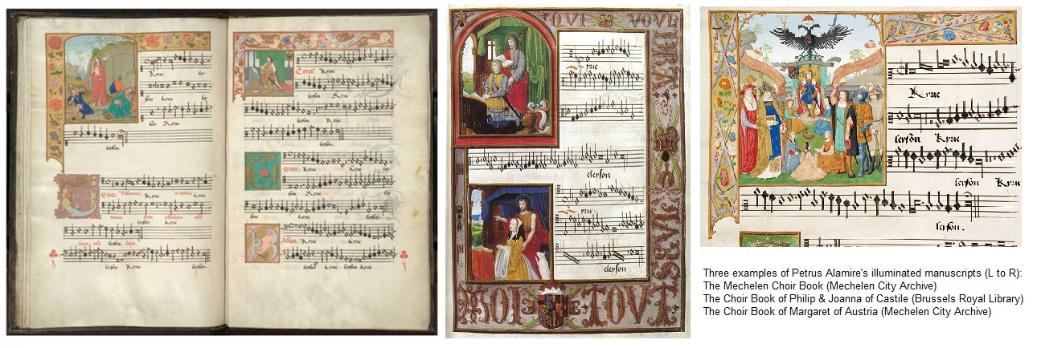PETRUS ALAMIRE MUSICIAN & MASTER SPY
The Tudors were famously expert in the dark arts of espionage and employed extensive networks of spies to keep them informed of plots against them but perhaps the most unusual of their secret agents was the famous musician Petrus Alamire.
Alamire was born in 1470 to a family of Dutch merchants living in Nuremberg. His real name was (probably) van den Hove but once he’d returned to the Low Countries, and embarked on his legitimate career as a singer and music copyist, he adopted a pseudonym based on the sol-fa musical scale (A+la+mi+re). No doubt this ingenious piece of branding helped bring Alamire to the attention of wealthy patrons and by 1503 he was producing beautifully illuminated musical manuscripts for the imperial Hapsburg family. Alamire also spent much of his time travelling around the great cities of Northern Europe in pursuit of commissions and during one of his trips to London he was recruited as a spy.
Alamire’s work as an itinerant singer provided the perfect cover for his clandestine operations and Henry VIII was in desperate need of intelligence. For forty years, the Tudors had systematically eliminated all Yorkist claimants to the throne but the White Rose still bore a few thorns and the sharpest was Richard de la Pole. With help of French gold, Richard maintained a glittering Yorkist court-in-exile in the free city of Metz and Alamire was given the task of infiltrating this nest of rebels.
Letters in the British Library show that between 1515 and 1518 Alamire visited Richard’s court on numerous occasions and sent regular coded reports to Henry’s envoy in the Low Countries Thomas Spinelly. One these reports, dated 4th October 1516, mentions Richard’s plans to invade England with a French army but Alamire also reveals that the House of York’s last heir was homesick.
Alamire records his conversation with Richard in which the White Rose asks if Henry VIII would pardon him if he asked for forgiveness. Alamire replies that: ‘the king’s character was most clement’ but Richard soon changes his mind and declares: "if I were to write to his majesty, and he [Henry] were to send the letter to the King of France, I should lose the friendship of France." Alamire ends his report: “Next morning [I] went to him again, and found him in a garden alone, when he exacted a promise [from me] not to speak of anything.” He signs his report with three musical notes: La-Mi-Re.
The White Rose seems to have recovered his nerve quickly because, in a letter dated 14th December 1516, Alamire reports that Richard de la Pole was now conspiring with the Duke of Albany (the Scottish Regent) and the French king to invade England. Alamire also remarks: “the devil was never so anxious to destroy souls as he [Richard] is to destroy the King of England.” Though this invasion never took place, Alamire continued to supply London with vital intelligence for another 18 months but in the murky world of espionage things are not always what they same.
As early as the 24th of April 1516, Thomas Spinelly had written to the king warning him that Alamire was not to be trusted and most probably “favoured de la Pole”. Similarly, in a letter dated 17th of September 1517, another of the king’s diplomats named Cuthbert Tunstall insisted that the ‘singer Alamyre’ [sic] was the double agent who’d been betraying Henry’s secrets to the Yorkists. No doubt the king was furious to learn that he’d been duped but Alamire seems to have known that his cover had been blown and he wisely ignored his master’s repeated orders to return to England.
Despite incurring the wrath of the Tudors, Alamire’s career as a musician flourished after he’d left Henry’s service and he continued to mix with Northern Europe’s glitterati. In 1520 he met the theologian Erasmus, who described the singer as “not unwitty”, and later he accepted an invitation from the King of Denmark to instruct him in ‘the art of mining’. Considering Denmark’s relative lack of mineral wealth this was probably a euphemism for more espionage!
Always a favourite of the Hapsburgs, Alamire spent his last years in Mechelen at the court of Mary of Austria (who governed the Low Countries on behalf her brother the emperor Charles V from 1531 to 1555). Alamire died in 1536 but, whilst his contribution to Western music is celebrated to this day, his career as a spy has remained in shadows – until now. Petrus Alamire, together with the trombone player Hans Nagel who often acted as his courier, are among the real historical figures who appear in my historical adventure story The Devil’s Band. To order click here
